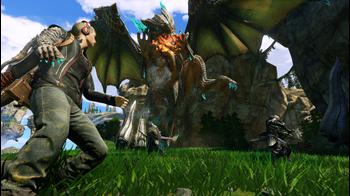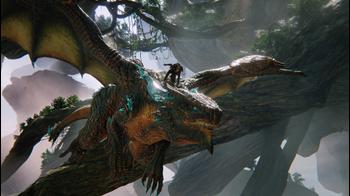
Scalebound looks like the most interesting big-budget Japanese RPG in a while
When Scalebound appeared at Microsoft's Gamescom 2015 press briefing, I have to admit that while I was intrigued, my professional brain was 'off'. I was there for RPG Site, and it was, I figured, to be an action game - the genre its creator Hideki Kamiya and studio Platinum is best known for. When Kamiya described the title as an Action RPG, I of course perked up - and after a hands-off live gameplay demo driven by the man himself, I'm now utterly convinced it's going to be a major release for the genre next year.
Kamiya and Platinum's reputation for creating action games is one of the first things he addresses when we meet. "I hope you'll agree that at Platinum Games we've earned a reputation as creators of cool, fast-paced, stylish, sometimes over-the-top action games," he grins, "But Scalebound is not an action game. It's an Action RPG."
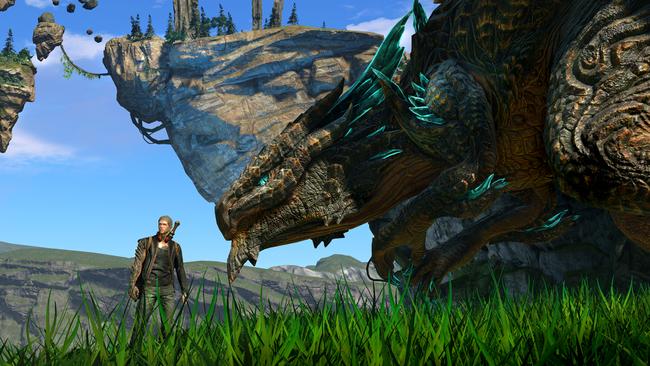
While the demo he gives does spend a good chunk of its time focusing on Scalebound's core action-styled combat, Kamiya explains that he's keen to ensure we don't walk away from the demo thinking of this as just another game from Platinum. Scalebound is his dream project, he explains, and one that owes much to the creation of Okami, Kamiya's classic PS2 title based on Japanese legend.
"I believe everyone thinks Bayonetta and Devil May Cry when they think of my titles," he explains, "But if I go back in time for me, career wise, the first title that I directed was Resident Evil 2. I also created Okami - there are other types of games that I've worked on in the past."
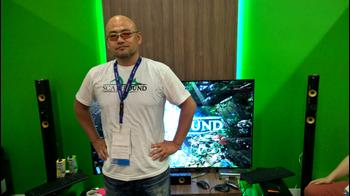
"When it comes to Scalebound, I think there are some learnings from all of the games that I've worked on in the past. Especially in area design, and steering away from the pure action game. The experience I've had with Okami really helped me try to think in a different way, to approach things from a different angle in terms of the structure, the narrative and so on."
Scalebound's narrative is the story of a man and his dragon - the man, Drew, is a regular guy from our modern world who somehow is dragged from his home land and flung into a fantasy world - thus the contemporary clothes and Beats-style headphones. Events transpire and Drew ends up directly connected to Thuban, a hulking beast of a dragon who is 'bonded' to Drew - their fates are now intrinsically linked.
"The story is really focused on building a relationship with Thuban," Kamiya notes. "They are sharing their life force. In order to survive in the world of Draconis, they have to work together and look after each other."
While the basic beats of Scalebound's combat look and feel like Platinum's polished action games, it's in Thuban and other small touches that the RPG begins to shine through. An AI companion, Thuban more or less does what he wants but will react to you within the right conditions. At one point, the Platinum staffer controlling the demo picks up a giant mine and tosses it onto a massive beast that Thuban and Drew are battling. When the mine stuns the beast, Thuban takes the opportunity to strike with a slower, more powerful attack.
Kamiya describes Thuban as a "very independent" character whose personality shows in his AI. We were told that throughout the week of repetitive Gamescom press demos, Thuban has repeatedly surprised the Platinum staff by doing wildly unexpected but often helpful things in battle that they hadn't witnessed before.
While as a character he'll act on his own and do as he wishes, there are simple commands one can give such as to attack a specific target or hold back, helping to avoid any frustration for the player.
Crucially, Thuban and Drew's narrative link also plays into gameplay - the pair share life energy, represented in Scalebound as an energy called 'Pulse'. "If Thuban is downed, Drew will also eventually be downed. If Drew dies, Thuban will eventually die," Kamiya notes. There's what's described as a "grace period" when Thuban is downed where Drew can revive him - but the hulking dragon isn't able to return that favor.
"If you know that you're about to die - as Drew - then you can command Thuban to save or protect you," Kamiya suggests. "That's a command you could pull out so that you can survive that battle."
Given his size, Thuban of course does a lot of the damage to many enemies - which interestingly pushes the player into a support-style role. During the demo we see Drew scan enemies for information and weaknesses, use Pulse Energy to attack from range, and even heal Thuban when needed.
When the situation requires it, Drew can transform into his 'dragon form', powering him up and making him far more damaging with his melee attacks - making things a much more Bayonetta-like, action-driven affair.
Thrumming licensed music blasts out as this happens - in-universe coming from Drew's headphones - and for a period, Drew can stand toe-to-toe with massive enemies himself and perform special moves with devastating properties.
While Thuban and Drew's interplay is key to combat, Drew can stand up for himself just fine - and in some cases will have to. "In areas that're very narrow and tight, Thuban is too big to be able to follow or walk alongside Drew - so there will be times when you'll be separated, and Drew will need to figure out how to progress alone," Kamiya reveals.
That's the combat, then - and it looks solid and satisfying. But what of the RPG mechanics? While Microsoft and Platinum weren't ready to talk in detail about every aspect, they were happy to dive into menus and give us an exciting first glimpse at character customization - all of which has an impact on both visuals and gameplay.
With Scalebound intended to include a 4-player co-operative option, a key point for Platinum is to ensure every Drew and Thuban pairing is unique. While Drew can use a number of different styles of weapon and will grow to a degree throughout the game by accruing skill points and Gems, the in-game currency, most of the customization falls on ensuring your Dragon buddy is best-equipped to aid you in combat.
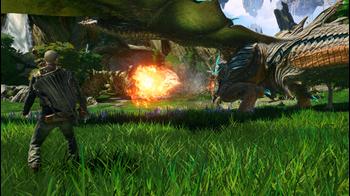
The intent, a Microsoft PR rep later explains, is to have a relatively static and predictable protagonist for story purposes while pinning fully-open RPG customization for the player to invest in on another, constantly present companion. It's actually a rather clever solution to one of the genre's oldest problems.
A multitude of options are available for each part of the dragon's body, each one not only changing its look but also its battle utility - something Kamiya explains will have a deep impact on how combat plays out.
"There's intent, a purpose, a meaning behind all those customization variations," he says. "For instance, different elements - in the demo, Thuban was using fire - fire breath was his main thing - but here we've also just shown you ice. There are enemies that are weaker to certain elements - fire, ice, and there'll be other further elements in the game."
The scope glimpsed in Scalebound's dragon customization menus is impressive, with the game encouraging players to 'Evolve' every aspect of their version of Thuban to fit their tastes. It's possible, it appears, to create a Thuban that's fairly unique in both utility and visually - and on top of that you can then equip armor atop that to further augment the look and gameplay impact.
"Armor also isn't purely cosmetic - there are different sets of armor with different effects," Kamiya elaborates. "Some may be heavier and stronger, so you'll take less damage - but in being heavier that means the movement of your dragon will be slower. Alternatively, it may be lighter and not as powerful, but will allow for more agile movement. Some might be the best of both worlds, somewhere in the middle. There's a wide amount of variation."
The customization looks impressive both in terms of the impact it'll have and the visual variation - which appears to get impressively broad. Talk of making Thuban an always-present but non-playable AI character reminds me of the Final Fantasy XV team's talk of making that game's party memorable and personality-filled in battle - but instead of promising that 'skills and progression will come later', Platinum was ready to show it in action right away at Gamescom.
Platinum wasn't quite finished with trying to convince us of Scalebound's RPG chops there - and though time was now running short, they ran a quick video to underline the key concepts that they feel fans should know they're focused on. The video offered a wider look at the range of areas that'll feature in Draconis, Scalebound's world, underlining that full RPG exploration with plenty of side quests will be available. We see a village filled with NPCs to interact with the promise that they'll "make the world real," weapon management, and a Resident Evil style 'Tetris' inventory. As such short glimpses go, it's convincing - Scalebound looks deep.
That's the thing, it seems, that Kamiya is keen to underline for all - the scope and scale of this project. He's an accomplished and acclaimed game creator, but this is new territory for him. He has several critical darlings under his belt already - but this is something new and more ambitious.
"Bayonetta, to some, can be seen as a 'shorter cycle' game," he admits, using one of his most successful titles as a benchmark.
"Once you clear it, you may want to go back and hone your skills some more, or someone might be so satisfied that they quit it and that might be the end of it; the same goes for a game like Okami.
"In Scalebound, the world is so large that it's tough for me to say what the expected average play time would be. In addition to that, this game isn't - or at least I hope it isn't - the type of game where you just linearly travel from beginning to end, and that's it.
"There's so many side things that are going to sprinkled throughout this vast world; my hope is that you'll go back to areas or revisit a dungeon or two in order to pick up items that weren't available the last time you visited, or clear an old area in a new and different way. There's a lot of investment that I think will end up meaning that people will play this title for a longer span of time - much different to how you quickly clear an action game."
Scalebound is a RPG, then - and not just another Action RPG, but a contender for quite possibly the most interesting and different big-budget RPG to come out of Japan in a generation. Between this and Sony's Horizon Zero Dawn, 2016 looks to be a hell of a year for new big-name RPG properties. Okay, Platinum. You have our attention - we can't wait to see more.
Scalebound is due out in Late 2016, but is available for pre-order now.
